Hi, I’m Abu Hasan Lavlu
a
Digital Marketer
SEO Expert
A professional Digital Marketer, SEO Specialist, and Co-Founder of Digital Crop. With over 8 years of experience, I’ve helped businesses thrive in the digital world by increase their online presence. My expertise spans SEO, Social Media Management, Social Media Marketing, Paid Advertising, and Content Marketing.
I have expertise in Digital Marketing, Meta Advertising, Social Media Management, Google & YouTube Advertising, Reddit Marketing, and Marketing Consultancy. Whether you want to organically grow your search rankings, engage your audience, or drive targeted traffic, I’m here to help your business grow and succeed.


My Expertise
SEO
Meta Advertising
Social Media Management
Reddit Marketing
Google & Youtube Ads
Marketing Consultancy
Services That Drive Results

Search Engine Optimization (SEO)
Boost your online visibility with effective SEO strategies that improve search rankings and drive organic traffic.
Meta Advertising
Associate with your absolute audience through targeted Meta ads to improve engagement and drive profitable ROI.
Social Media Management
Build your brand and connect with audience through smart, consistent social media management that turns loyal followers

Reddit Marketing
Make your brand a topic of conversation on Reddit – connect with niche communities and drive genuine interest and traffic to your site, creating real engagement.
Google & Youtube Ads
Promote your brand's presence and attract quality leads with tailored ads on Google and YouTube, ensuring your band reaches those who matter most.
Marketing Consultancy
Take your marketing next level with expert-crafted strategies and implementation plans, carefully designed to align with business goals and online presence.
My Experience
Digital Marketing Specialist & Marketing Consultant
Digital Crop | October 2020 – PresentI co-founded Digital Crop, where I design business strategies, set performance goals, and oversee daily operations. I manage partner relationships and lead teams across marketing, sales, and IT to drive growth and meet company objectives.
Digital Marketing Manager
GoCareers | January 2021 – May 2023I developed digital marketing strategies to increase brand awareness, web traffic, and leads. I optimized SEO, SEM, and social media campaigns while analyzing data to improve ROI. Collaboration with cross-functional teams was key to our success.
ITS Engineer
Hyundai Engineering & Construction Co., Ltd. | March 2018 – October 2020I contributed to major infrastructure projects like the Lusail Expressway, deploying ITS technologies for traffic management. My work involved integrating advanced systems like adaptive signals and traffic sensors to improve safety and reduce congestion.
My Recent Work

As Digital Marketing Manager at GoCareers, Abu Hasan spearheaded a comprehensive digital strategy to enhance brand awareness, drive user engagement, and increase lead generation for the South African market. By implementing a robust SEO plan, optimizing SEM campaigns, and leveraging targeted content marketing, he significantly improved website traffic and user experience, helping to establish GoCareers as a trusted platform for career resources. Collaborating with cross-functional teams, he also worked to optimize user interfaces and streamline conversion paths, ultimately positioning GoCareers for growth in a competitive landscape. This effort reinforced GoCareers’ reputation as a leading career portal in South Africa, helping job seekers connect with career opportunities nationwide

Boosting Online Presence for Santa Ynez Wine Tours
I collaborated with Santa Ynez Wine Tours to expand their reach and visibility in a competitive travel niche. By optimizing SEO, I enhanced their search rankings, increased organic traffic, and ensured their website stood out to potential tourists. Through targeted social media strategies, I built engagement across platforms, sharing compelling content that highlighted the unique experiences of the Santa Ynez wine region. This combination of SEO and social media marketing fostered a robust online presence, attracting new clientele and driving booking inquiries for unforgettable wine tours.

Elevating Reach for All Bursaries in South Africa
I partnered with All Bursaries to increase their visibility among students seeking financial aid opportunities. Through strategic SEO improvements, I boosted the site’s rankings for high-traffic keywords, making it easier for students to discover relevant bursary information. My targeted social media campaigns effectively engaged a broader audience, spreading awareness about scholarship opportunities and resources. This integrated SEO and social media approach expanded All Bursaries’ online reach and connected more students with essential educational funding options.

Optimizing Visibility for Money Today South Africa
I collaborated with Money Today to enhance their search engine rankings and attract a wider audience in the financial news sector. By implementing advanced SEO strategies, including keyword optimization, content structuring, and backlink building, I helped position the site prominently for relevant finance-related queries. This optimization has improved the site’s organic reach, increased readership, and provided users with timely financial news and insights, fostering Money Today’s growth as a trusted resource in South Africa’s financial industry.

Boosting Engagement for The Labrador Family
I partnered with The Labrador Family to elevate their online presence through tailored SEO and Social Media Marketing. By refining keyword strategies, optimizing content, and securing backlinks, I increased their visibility for pet-related searches. Simultaneously, I developed engaging social media campaigns to build a loyal community of Labrador enthusiasts. This combined approach enhanced the site’s organic reach, boosted engagement rates on social platforms, and solidified The Labrador Family’s position as a go-to resource for Labrador lovers worldwide.

Strategic Content Planning for Projuktir Vasha
For Projuktir Vasha, I created a comprehensive content plan tailored to enhance their reach in the Bengali tech community. My approach included identifying trending topics, organizing a publishing calendar, and optimizing content for search engine visibility. This strategy helped streamline content flow, improved audience engagement, and increased website traffic, positioning Projuktir Vasha as a reliable source for Bengali technology insights and updates.
Testimonial
Sarah M.
Working with this team has been a game-changer for our business. Their attention to detail and commitment to our success are truly unmatched!
James L.
I can’t recommend them enough! They took the time to understand our needs and delivered results that exceeded our expectations.
Emily R.
Professional, knowledgeable, and incredibly supportive throughout the process. I felt valued as a client and the results speak for themselves!
Michael T.
Their innovative approach and strategic insights have helped us grow in ways we never thought possible. A fantastic partner to have!
Linda S.
From start to finish, the experience was seamless. The team was responsive and proactive, making the entire process a pleasure.
David H.
I’ve worked with several agencies, but none have been as dedicated and results-driven as this one. Highly recommend their services!
Rachel K.
"They truly listen to their clients and tailor their solutions accordingly. I felt heard and supported every step of the way.
Chris W.
"An outstanding team that goes above and beyond. Their expertise and friendly approach made our project a success!
Jessica F.
They delivered on time and on budget, which is rare in this industry. I’m thrilled with the outcome and will definitely return!
Brian P.
Their creativity and passion for what they do shine through in every aspect of their work. I couldn’t be happier with the results!
Nina P.
Working with Abu Hassan Lavlu was a pleasure. He is responsive, reliable, and truly cares about his clients' success!
Tom H.
Abu brought a fresh perspective to our project. His creative approach and expertise made a significant difference!
Lisa W.
I appreciated Abu's ability to listen and understand our goals. He delivered exactly what we needed, on time and on budget!
Raj A.
Abu is a fantastic collaborator. His positive attitude and professionalism made every meeting enjoyable and productive!
Featured Clients
Latest Blog
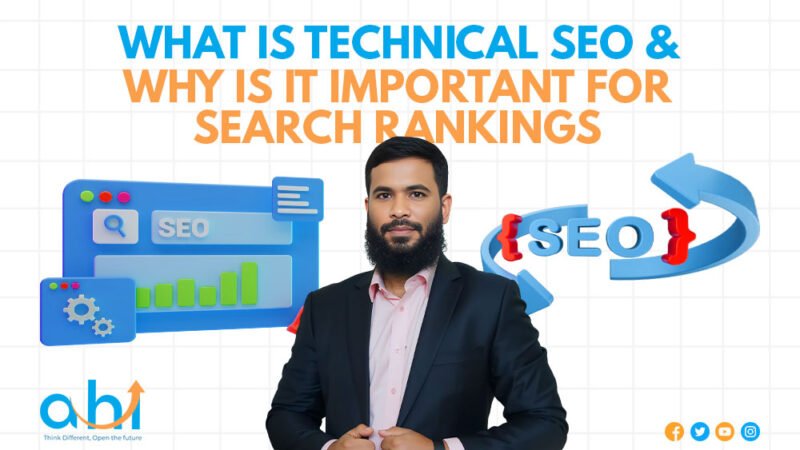
What Is Technical SEO & Why Is It Important for Search Rankings
Creating high-quality content alone does not cut it in digital marketing. Once you optimize your website to be visible to your audience, you can put your website to be forgotten. This is where technical SEO helps. Certainly, it helps for engines to crawl your website, index it, and understand your website. In other words, it helps your website be visible and ranked. For any business or website owner aiming for long-term value, enough value is in understanding what is and how technical SEO works and why it matters.
Having experience in advanced technical SEO, and SEO audit consultancy where I helped businesses, I understand how impactful small technical issues can be to your SEO rankings. This guide will take you from the basic technical SEO audit and will help you with advanced tips, tools, and strategies.
Table of Contents
ToggleWhat Is Technical SEO?
Technical SEO is the part of SEO which optimizes the website’s hidden system. It helps the search engines crawl your site, references index, and ranks the content. Technical SEO does not work with content creation or audience engagement like on-page or off-page SEO. It is concerned with the site’s performance, security, and overall structure.
Improving the technical side of your website means laying a better foundation to help build your content and links. Some of the most important areas are:
- Website Crawlability and Indexation: Making sure your pages are reachable.
- Site Speed and Core Web Vitals: Improving the load time, LCP, CLS, and INP.
- Mobile Friendliness: Complying with Google’s mobile-first indexing.
- Security: Using HTTPS and secure protocols.
- Structured Data and Schema: Helping search engines get the context of your pages.
By addressing these factors, technical SEO issues like broken links, duplicate content, or slow pages are minimized, creating a strong foundation for higher rankings.
Google Search Console, Screaming Frog, and SEMrush are great tools to get a proper technical SEO audit.
Why Is Technical SEO Important?
Having a website with technical SEO means your pages are fast, secure, and easy to crawl. This all directly impacts search engine rankings, user experience, and the growth of organic traffic.
In 2025, search engines will prioritize not only the quality of content, but also the experience and performance of the website. Here is why technical SEO for WordPress and other platforms is important:
- Improved Search Engine Crawl Efficiency: Helps avoid missed pages and indexing issues.
- Increased Page Load Speed: Quicker pages improve user engagement and decrease bounce rate.
- Improved Mobile Optimization: Websites that are mobile-friendly are ranked higher in Google’s mobile-first index.
- Let’s look at the raw facts: Fixed redirect chains, 404s, and broken links improve site health.
- Let’s delve deeper: Proper site architecture and the use of structured data afford your content the opportunity to appear in rich results and featured snippets.
Ignoring technical SEO tips can cause even the best content to underperform in search results.
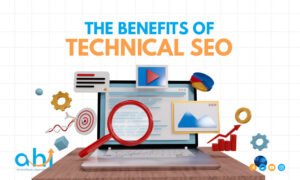
The Benefits of Technical SEO
- Higher Search Rankings: Websites with optimized structure and performance rank better.
- Better User Experience: Fast, secure, and mobile-friendly sites retain visitors.
- Increased Organic Traffic: Efficient crawling and indexing ensure more pages rank.
- Improved ROI: Fewer technical issues mean less spending on corrections and more sustainable growth.
- Enhanced Compatibility with AI Search: Technical SEO ensures your site works with AI-powered search engines and voice search.
Pro Tip: Missing even fundamental, basic elements like canonical tags houses slow-loading images, reinforcing the need for regular technical SEO audits to rectify the problems and maintain the health of your site.
Technical SEO Audit: The First Step Toward Optimization
A technical SEO audit prioritizes the unresolved problems of your website regarding its technical health, determining elements restricting crawlability, indexation and rank. This is the first step of focused improvements.
An effective technical SEO audit involves:
- Crawl Analysis: Look for and fix problems found in Google Search Console and your crawl tools.
- Site Performance Analysis: Evaluate Core Web Vitals, page speeds, and server response times.
- Mobile and User Experience Testing: Diagnose for mobile usability and navigational ease.
- Security Checks: Determine if data privacy, HTTPS, and SSL certificates are in place and functioning as they should.
- Content Structure Analysis: Assess work regarding canonical tags, meta tags, schema markup, and internal linking.
- Technical SEO Tools: Screaming Frog, Sitebulb, Ahrefs, and SEMrush are just a few examples that allow for technical SEO automation.
For businesses, hiring technical SEO audit consultancy services can save time and provide advanced insights for enterprise-level optimization.
Technical SEO Checklist: Step-by-Step Guide
A comprehensive technical SEO checklist makes sure no part of your website’s technical health is missed. The following steps should be taken to improve crawlability, indexation, and website performance as a whole.
- Site Crawl & Indexation
- Ensure all important pages are indexable.
- Use robots.txt to block irrelevant pages.
- Check noindex/nofollow tags for correctness.
- Monitor Google Search Console for crawl errors.
- HTTPS & Site Security
- Switch to HTTPS to secure your website.
- Install valid SSL certificates.
- Avoid mixed content issues that affect ranking.
- Mobile-Friendliness
- Use responsive design for all devices.
- Test with Google’s Mobile-Friendly Test.
- Optimize buttons, navigation, and font sizes for mobile users.
- Page Speed Optimization (Core Web Vitals)
- Reduce the time it takes to display the most important pieces of content (Largest Contentful Paint, LCP).
- Focus on minimizing the shift of content (Cumulative Layout Shift, CLS).
- Work on the speed of interactions and subsequent painting of the display (Interaction to Next Paint, INP).
- Optimize images, set up caching with dynamic content, and configure a Content Delivery Network (CDN).
- URL Structure & Canonical Tags
- Short and readable URLs with relevant keywords will be appreciated.
- Reduce duplicate content by using canonical tags.
- Keep a consistent hierarchy of your URLs.
- XML Sitemap & Robots.txt
- Provide an up-to-date XML sitemap to search engines.
- Your robots.txt should only block unnecessary pages.
- The sitemap should have no broken or redirected URLs.
- Internal Linking & Navigation
- Establish a clear site structure.
- Use anchor texts that are descriptive and relevant.
- Regularly link important pages to enhance the SEO value.
- Fixing 404 Errors & Redirects
- Find and repair broken links.
- Use 301 redirects to reroute users and avoid broken links, and related loops or chains.
- Structured Data / Schema Markup
- Include schema markup for your products, articles, FAQ and events.
- It will help search engines understand your content and show rich results.
- Image Optimization
- Optimize images by keeping their quality after compression.
- Use descriptive keywords in your ALT tags.
- Use lazy loading so pages can load faster.
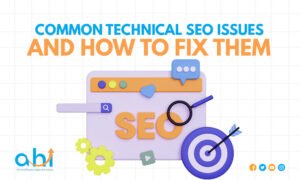
Common Technical SEO Issues and How to Fix Them
Most websites deal with technical SEO issues such as broken links, slow loading pages, duplicate content, and missing schema. Fixing these problems leads to better crawlability, indexation, user experience, and improved rankings on search engines.
- Issues with Crawls:
- Identify issues with Google Search Console.
- Fix broken links, 404 pages, and blocked resources.
- Duplicate Content:
- Use canonical tags to indicate the preferred version.
- Avoid publishing identical content across multiple URLs.
- Redirect Chains & Loops:
- Simplify redirects; avoid multiple hops.
- Use 301 redirects for permanent URL changes.
- Slow Loading Pages:
- Compress images, minify CSS/JS, and enable caching.
- Test with PageSpeed Insights and GTmetrix.
- Heavy JavaScript Impact:
- Ensure important content loads without blocking.
- Consider server-side rendering or dynamic rendering.
- Missing Structured Data:
- Implement schema markup for rich results.
- Use Google’s Rich Results Test to validate.
- Problems with Mobile Optimization:
- Ensure responsive design, legible fonts, and accessible navigation.
- Test responsive design with Google Mobile-Friendly Tool.
By fixing technical SEO issues, you can improve user experience, make your site better for search engines and gain an advantage over your competitors.
Top Technical SEO Tools (Free & Paid)
Using the right technical SEO tools helps identify, analyze, and fix issues efficiently.
- Google Search Console: For documenting crawl errors, indexing, and mobile usability, use Google Search Console.
- Screaming Frog: For in-depth site crawling and technical audits, use Screaming Frog.
- Sitebulb: Use Sitebulb to obtain visual site audits along with actionable insights.
- Ahrefs Site Audit: For broken link and performance, security issue audits use Ahrefs Site Audit.
- SEMrush: Use SEMrush for comprehensive site audit, competitive analysis, and to obtain health score.
- Google PageSpeed Insights & Lighthouse: Use Google PageSpeed Insights in conjunction with Lighthouse to analyze page speed, Core Web Vitals, and accessibility.
- GTmetrix: For performance analysis use GTmetrix. It provides detailed performance reports and recommendations.
Pro Tip: Using different tools helps to cross verify and understand your website’s technical health more clearly.
Advanced Technical SEO Techniques
Advanced technical SEO focuses on optimizing site architecture, structured data, Core Web Vitals, and server performance to maximize search engine rankings and user experience.
- Structured Data & Schema:
- Implement FAQ, Article, Product, and Event schemas.
- Enhances visibility in rich results.
- Core Web Vitals Optimization:
- Improve LCP, CLS, INP for better UX and ranking.
- Use tools like PageSpeed Insights and Web Vitals extension.
- Server-Side Rendering (SSR) & Lazy Loading:
- SSR improves JavaScript SEO for dynamic websites.
- Lazy loading reduces initial load times for images/videos.
- JavaScript SEO & Dynamic Rendering:
- Ensure critical content is rendered for crawlers.
- Avoid content hidden behind complex scripts.
- Log File Analysis:
- Study crawl behavior of search engines.
- Identify high-priority pages and potential bottlenecks.
- Technical SEO for WordPress:
- Use lightweight themes, update plugins, and implement caching.
- Use SEO plugins like Yoast or Rank Math for advanced optimizations.
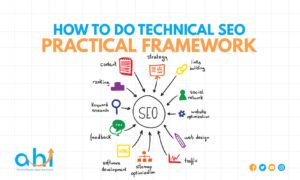
How to Do Technical SEO: Practical Framework
To do technical SEO effectively, start with a comprehensive audit, prioritize issues based on impact, implement fixes systematically, and monitor performance regularly to maintain optimal website health and search rankings.
- Step 1: Conduct a Technical SEO Audit
- Use Screaming Frog, Sitebulb, or SEMrush to crawl your website.
- Check for crawl errors, broken links, duplicate content, and indexing issues.
- Review Core Web Vitals, mobile usability, HTTPS, and site speed.
- Step 2: Prioritize Fixes
- High-impact: broken pages, redirect chains, site speed.
- Medium-impact: internal linking issues, meta tags, image optimization.
- Low-impact: minor canonical fixes, structured data improvements.
- Step 3: Implement Changes
- Fix 404 errors and set up 301 redirects.
- Compress images, minify CSS/JS, enable caching, and use a CDN.
- Optimize URLs, internal links, and schema markup.
- Ensure mobile-friendly layouts and responsive designs.
- Step 4: Monitor & Maintain
- Track improvements in Google Search Console and analytics.
- Regularly perform technical SEO audits every 3–6 months.
- Keep WordPress plugins/themes updated to avoid conflicts.
Pro Tip: Use a technical SEO audit consultancy for enterprise-level websites to catch advanced issues and implement long-term strategies.
Technical SEO Tips for Better Rankings
- Conduct regular technical audits to spot issues early.
- Optimize Core Web Vitals for better user experience.
- Use structured data for rich snippets and featured results.
- Minimize JavaScript render-blocking and optimize CSS.
- Maintain mobile-first design and fast loading times.
- Keep internal linking logical and strategic to guide crawlers.
- For WordPress: use lightweight themes, SEO plugins, and caching solutions.
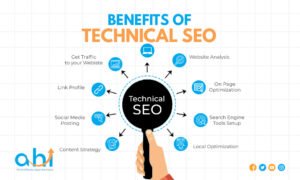
Benefits of Technical SEO
- Improved Search Engine Rankings: Correct technical SEO issues boost visibility.
- Enhanced User Experience: Faster and secure websites retain visitors longer.
- Higher Organic Traffic: Better crawlability ensures more pages are indexed and ranked.
- Long-Term ROI: Fewer technical problems reduce maintenance costs and increase sustainability.
- AI & Voice Search Ready: Structured data and optimized architecture improve compatibility with AI search engines.
Expert Tip: Businesses often underestimate the impact of technical SEO. Even minor improvements in site speed or structured data can result in significant traffic gains.
Conclusion
Understanding what is technical SEO and implementing it effectively is no longer optional; it is crucial for modern SEO success. From conducting a technical SEO audit to fixing errors, optimizing site structure, and leveraging advanced tools, every step contributes to higher rankings, better user experience, and sustainable organic growth.
As an SEO professional, I recommend keeping a technical SEO checklist, monitoring performance regularly, and staying updated with latest SEO trends, AI indexing changes, and Core Web Vitals updates. This approach ensures your website not only meets current SEO standards but also remains competitive in the rapidly evolving digital landscape.
FAQs
What is technical SEO and why is it important?
Technical SEO is the process of optimizing your website’s backend and infrastructure to ensure it is crawlable, indexable, and secure, which directly affects search rankings, traffic, and user experience.
How do I perform a technical SEO audit?
Perform a technical SEO audit by analyzing site crawlability, indexing, Core Web Vitals, mobile usability, HTTPS, broken links, and structured data using tools like Screaming Frog, Sitebulb, or SEMrush. Prioritize issues based on impact for improvements.
What are the best technical SEO tools in 2025?
Top technical SEO tools include Google Search Console, Screaming Frog, Sitebulb, SEMrush, Ahrefs, GTmetrix, and PageSpeed Insights, which help identify crawl errors, site speed issues, mobile optimization gaps, and schema opportunities.
How can I fix technical SEO issues on WordPress?
For technical SEO on WordPress, use lightweight themes, caching plugins, SEO plugins (Yoast/Rank Math), compress images, fix broken links, implement schema, and ensure mobile responsiveness and fast load times.
What should a technical SEO checklist include?
A technical SEO checklist includes site crawlability, HTTPS security, mobile-friendliness, page speed optimization, URL structure, sitemap & robots.txt, internal linking, redirects, structured data, and image optimization.

Google Ads Competitor Analysis: Spy, Strategize, and Scale Smart
Table of Contents
Toggle1. Introduction
In the fast-paced environment of digital marketing, keeping ahead of the competition is a must. One of the most insightful ways to do this is with a Google Ads competitor analysis. Understanding how your competition uses Google Ads reveals valuable insights into their strategies, strengths, and weaknesses. This also enables you to optimize your own campaigns and surpass them. In this post, we’ll explain in detail the importance of Google Ads competitor research and how it can help you plan and scale intelligently.
2. What is Google Ads Competitor Analysis?
Google Ads competitor analysis involves researching and evaluating the strategies utilized by your competitors on the Google Ads platform. These may include their ad copy, target audience, bidding and bidding techniques, keywords, and more. Competitors’ campaigns reveal a lot when you know how to analyze them. Identifying gaps in your competitors’ strategies provides critical insights to leverage. There are trends, gaps, and chances you can exploit that would significantly improve your campaigns.
Competitor research goes beyond monitoring ads; it involves their spending strategy, assessing the performance of particular keywords, and the kind of ads run at different levels of the marketing funnel. The insights you gain into your competitors’ approaches will improve your own Google Ads strategies and ensure you outperform them.

3. Why Should You Care About Competitor Research?
Learning about competitors in Google Ads isn’t just about spying. It is much more than that; it is a strategy that can help any business grow. Keeping tabs on other businesses in the same niche and industry allows you to do the following:
- Identify profitable keywords: When competitors consistently bid on certain keywords, those terms are likely converting.
- Discover high-performing ad copy: Successful messaging and tone can be incorporated into more engaging ads.
- Spot opportunities for optimization: Identifying gaps in your competitors’ strategies provides critical insights to leverage.
Ultimately, competitors’ research allows businesses to avoid mistakes and make better positioning decisions.
4. How to Find Your Competitors on Google Ads
Finding your competitors on Google Ads might be a bit challenging at first, but it is relatively easier once you have some guidance. You have to start with the keywords that are important within your niche and industry. Try searching on Google for these keywords to check which ads pop up. Focus on companies that feature prominently and consistently in the uppermost ad slots; chances are, they are your competitors.
You may also get a more in-depth look at who is competing for the same keywords with tools such as Google’s Auction Insights. This tool provides insights into competitors’ impression share, average position, and overlap rate, which help in estimating the competition in your market.
5. Tools for Google Ads Competitor Analysis
For a more advanced analysis of your competitors’ strategies, there are several targeted tools designed specifically for Google Ads. A few of the most trusted ones are listed below:
- SEMrush: SEMrush has a competitive research toolkit that enables discovering details about competitors’ ad copy, keywords, and even bidding strategies. Monitoring their performance is also possible, along with spotting areas where they can be improved.
- SpyFu: SpyFu lets you track competition spending on bidding keywords and even their ad performance over time. It tells you what types of ads and landing pages drive traffic and how to best utilize them
- iSpionage: This tool enables you to spy on your competition by tracking the best-performing keywords, ads, and landing pages. It tells you how well your competitors are performing overall as well.
Using these tools will unlock a deeper understanding of the competitors’ strategies and assist you in shaping your own campaigns.

6. How to Check Your Competitors’ Google Ads Keywords
Competitor analysis is one of the best insights you can get from your competitors, and knowing which keywords they are targeting is the most useful. Here’s how to get to their keyword secrets:
- Manual Keyword Research: To uncover keyword strategies, start with searching relevant terms to discover what ads pop up. The search results page on Google will provide insight into what competitors are targeting as far as keywords based on the ads they show and the text within those ads.
- Using Competitor Analysis Tools: With tools like SEMrush, SpyFu, and Ahrefs, you can get a comprehensive list of keywords alongside their volume and cost-per-click (CPC). This helps you understand how valuable and competitive the keywords are.
Knowing the target keywords for your business, you can now optimize your own campaigns as well. It is ideal to bid on high-performing keywords or explore less competitive and highly relevant niche keywords.
Tracking your competitors’ keyword strategies enables you to uncover unused opportunities while avoiding overspending on highly competitive terms.
7. Analyzing Competitor Ads: Key Metrics to Focus On
Once you’ve identified your competitors and gathered data on their strategies, the next step is to analyze their performance metrics.
- Click-Through Rate (CTR): Click-through rate (CTR) is one of the most important metrics to track. Tracking the CTR will let you understand how effective an ad is at grabbing attention and help improve your own ad copy.
- Cost Per Click (CPC): This tells you what a competitor is paying for every click on their ad. Knowing how they bid can inform you on how to tweak your budget and bidding strategy to be more aggressive.
- Ad Copy and Messaging: Analyzing the tone and wording of your competitors can give you ideas to improve your own messaging. Do they talk about value propositions? Do they give out discounts? Or do they use urgency to lure clicks? Use these tactics in your ads to increase performance.
- Conversion Rate: While you can’t monitor your competitors’ conversion rates, SEMrush and SpyFu can estimate them based on the traffic volume and CPC data. A higher conversion rate can signal effective landing pages, great offers, or good targeting.
These metrics outline gaps in your marketing strategy while also providing your competitors with significant competitive advantages. Enhancing these aspects in your ads will increase performance.

8. Using Competitor Insights to Improve Your Google Ads Campaign
Looking at your rivals isn’t just about observing—it’s about taking actionable insights and applying them to your campaigns. Here is how observing your competitors can help you enhance your Google Ads:
- Refine Your Keyword Strategy: Use the competitor keywords you’ve discovered to expand or adjust your keyword list. You can even consider bidding on less popular keywords that still bring in quality leads.
- Enhance Your Ad Copy: If your competitors are continuously performing better than you in ads, enhance your ad copy by looking at what makes their ads successful. It can be persuasive words, emotions, or calls to action. Try to mimic these techniques in your ads while being original.
- Optimize Your Landing Pages: Analyze your competitors’ landing pages. What are they doing differently that is helping them convert visitors? Are they using strong CTAs, compelling visuals, or simple forms? Make sure your pages perform just as well, if not better.
- Improve Targeting: If your competitors are effectively targeting certain demographics, regions, or devices, look to make those adjustments on your own targeting settings so you can reach the best audience.
Using competitor analysis helps to understand the decisions made to increase Google Ads performance and ROI, so gather insights and take action.

9. How to Stay Ahead of Competitors with Google Ads
Google Ads competitor analysis should not be a one-time activity. The industry will never stop evolving, and the competition will always refine its tactics. To keep your edge, invest in these strategies:
- Regular Monitoring: Track your competitors’ advertisements on SEMrush or SpyFu regularly. Noting any changes to their advertising approach will help you to be more active and adapt promptly.
- A/B Testing: Test different ad variations and targeting options to see what works best. If your competitors are finding success with certain ads or keywords, test them alongside your own strategy.
- Expand into New Markets: If your competitors are only focusing on a specific region, consider expanding your reach into new areas where there may be less competition.
- Adjust Budgets Based on Insights: If you notice that a competitor has recently increased their ad spend or expanded their reach, consider doing the same. Analyze the results to see if the added budget improves your position in the market.
Success in business is no longer about what you do best but about staying one step ahead of your competitors. Keeping track of what they do and making the right choices based on data ensures that your campaigns keep performing well.
10. Conclusion
Competitor analysis in Google Ads is one of the most powerful weapons any digital marketer can wield. It gives insights into a competitor’s keywords, ad copies, and other parts of their marketing strategy, which in turn helps you plan and improve your own campaigns. The goal is to use the information in a smart manner to outsmart the competition, reach the right people, and expand your marketing initiatives. Using these strategies will help you immediately add more value to your Google Ads campaigns.
If you’re ready to take your Google Ads campaigns to the next level but need expert guidance, feel free to reach out! With over 8 years of experience in the field, I can help you optimize your strategy and drive better results. Contact me today to get started!

Facebook Ads Cost Explained: CPM, CPC & CPA Breakdown
Table of Contents
ToggleIntroduction
In 2024, Facebook (Meta) ads generated over $131 billion in revenue, proving its place as the dominant player in the social media advertising ecosystem. But with that dominance comes a critical question for businesses of all sizes:
“How much do Facebook ads cost?”
Spoiler: it’s not a flat fee.
Whether you’re a solopreneur with $10/day or an enterprise scaling with $100k/month, understanding Facebook Ads pricing—specifically CPM, CPC, and CPA—can make or break your return on investment (ROI). This article is your complete, data-driven guide.
We’ll break down:
-
- What influences Facebook ad pricing
- Real benchmarks from leading industries
- How to choose the right bidding model (CPM, CPC, CPA)
- Optimization tactics used by top marketers
Let’s decode the mechanics behind your Facebook ad bill.
How Facebook Ads Billing Works
Learn how Facebook charges advertisers through dynamic auctions and variable pricing models.
Unlike traditional advertising, Facebook doesn’t have a fixed price list. Instead, it uses a real-time auction system where you compete for ad space. Here’s how the billing works under the hood:
1. The Ad Auction
Every time a user logs in and scrolls, Facebook holds a lightning-fast auction to decide which ads they’ll see. You don’t always win just because you bid the most.
The winner is determined by a “Total Value” score, calculated as:
Total Value = Bid × Estimated Action Rate × Ad Quality
-
- Bid: Your chosen bid amount (manual or automatic)
- Estimated Action Rate: Facebook’s prediction of the user taking your desired action
- Ad Quality: Based on engagement, feedback, and relevance
2. Billing Triggers
You are charged based on your campaign goal:
-
- Impressions (CPM): Pay per 1,000 views
- Clicks (CPC): Pay per link click
- Actions (CPA): Pay when a user completes an action (purchase, lead, etc.)
3. Budget Types
-
- Daily Budget: Facebook spends up to the amount each day
- Lifetime Budget: Facebook spreads spend over the campaign duration
4. Billing Schedule
Billing typically occurs:
-
- After reaching your billing threshold
- Or at the end of each month
💡 Meta Tip: Use Campaign Budget Optimization (CBO) to let Facebook distribute your budget across ad sets dynamically.

What is CPM in Facebook Ads?
CPM (Cost Per Mille) is the amount you pay per 1,000 ad impressions. It’s ideal for increasing brand visibility.
CPM Explained
CPM stands for “Cost Per Mille,” or the cost to show your ad 1,000 times. You’re charged whether or not someone clicks.
This model works best for:
-
- Brand awareness campaigns
- Event promotions
- Product launches
For example, if your CPM is $12 and your ad is shown 100,000 times, you’ll pay:
(100,000 ÷ 1,000) × $12 = $1,200
Average Facebook CPM (2024-2025)
| Industry | Avg. CPM |
| Retail | $8.40 |
| Healthcare | $10.20 |
| Finance & Insurance | $13.75 |
| Ecommerce | $11.10 |
| Education | $7.80 |
When to Use CPM
-
- Launching a new product or service
- Running video view campaigns
- Maximizing exposure on a fixed budget
Drawbacks
-
- Low CTR risk: You’re paying whether they engage or not
- Better for top-of-funnel goals than direct conversions
What is CPC in Facebook Ads?
CPC (Cost Per Click) charges you only when someone clicks your ad. It’s ideal for driving traffic to your website or landing page.
CPC Defined
Facebook CPC is calculated as: CPC = Total Spend ÷ Total Clicks
Important: Facebook offers different types of clicks:
- Link Clicks: Clicks to external websites
- All Clicks: Includes likes, shares, and comments
Always measure based on Link Clicks when optimizing for traffic.
Average Facebook CPC by Industry (2024-2025)
| Industry | Avg. CPC |
| Ecommerce | $0.70 |
| Fitness & Wellness | $1.20 |
| Education | $1.05 |
| Legal | $1.80 |
| B2B SaaS | $2.50 |
Source: WordStream, Hootsuite Ads Report
When to Use CPC
-
- Promoting blog content
- Driving webinar sign-ups
- Sending users to a product page
How to Lower Facebook CPC
-
- A/B test creative headlines
- Narrow your audience targeting
- Optimize for higher relevance scores
- Exclude uninterested demographics
Case Study
A B2B SaaS firm reduced its CPC from $2.75 to $1.10 by:
-
- Retargeting warm leads
- Testing multiple ad creatives
- Using “Lookalike Audiences” based on LTV customers
What is CPA in Facebook Ads?
CPA (Cost Per Acquisition) tells you how much you pay for each completed action, such as a purchase or lead. It’s the gold standard for ROI-focused campaigns.
CPA Explained
CPA stands for Cost Per Acquisition (or sometimes Cost Per Action). Instead of paying for clicks or views, you’re charged only when a user completes a specified action.
Examples:
-
- Purchases
- App installs
- Lead form submissions
- Newsletter signups
Formula: CPA = Total Spend ÷ Total Conversions
How It Works on Facebook
To use CPA effectively:
-
- You need conversion tracking set up via Meta Pixel or Conversions API.
- Facebook uses machine learning to show your ads to people most likely to convert.
Pro Tip: Use the “Conversions” campaign objective and optimize for an event like “Add to Cart” or “Purchase.”
Average Facebook CPA by Industry (2024–2025)
| Industry | Avg. CPA |
| Ecommerce | $19.20 |
| Finance | $33.60 |
| Education | $12.90 |
| Legal | $45.00 |
| Health & Wellness | $24.80 |
Source: WordStream, Shopify Reports
When to Use CPA
-
- Your funnel is already tested and optimized
- You want high-ROAS campaigns
- You track meaningful bottom-of-funnel conversions
Drawbacks
-
- Requires more data (volume) for optimization
- Slower to train Facebook’s algorithm
- Can be costlier up front without proper segmentation
Case Study: CPA in Action
An online fitness program optimized its Facebook campaigns from a $30 CPA to $12 by:
-
- Narrowing lookalike audiences to 1%
- Testing short-form video creatives
- Using “Cost Cap” bidding to control acquisition cost

Facebook Ads Bidding Strategies & Optimization
Understanding how Facebook’s bidding strategies impact your ad costs is critical for consistent and scalable results.
Types of Facebook Bidding Models
| Bidding Type | Description |
| Lowest Cost | Facebook aims to get the most results within your budget |
| Cost Cap | Sets a max average CPA/CPC you’re willing to pay |
| Bid Cap | You set the max bid per auction |
| ROAS Target | Optimizes for specific return on ad spend |
Lowest Cost is recommended for beginners. Cost Cap is great for maintaining a stable CPA while scaling.
Top Facebook Budget Optimization Tactics
-
- Campaign Budget Optimization (CBO): Facebook auto-distributes budget across ad sets
- A/B Testing: Test creatives, placements, and objectives
- Advantage+ Placements: Facebook shows your ads across its full network (FB, IG, Messenger, Audience Network)
- Use Rules: Automate pausing underperformers (e.g., if CPA > $20)
Expert Insight
“Bidding isn’t just about cost control—it’s about signaling to Facebook the kind of results you want. Get that wrong, and no amount of budget will save you.”
— Jon Loomer, Facebook Ads Educator
Facebook Ads Cost Comparison: CPM vs. CPC vs. CPA
Not all cost models serve the same purpose. Choosing the right one depends on your objective, audience, and campaign maturity.
Comparison Table: CPM vs. CPC vs. CPA
| Metric | CPM | CPC | CPA |
| What You Pay For | Every 1,000 impressions | Each link click | Each conversion/action |
| Best For | Brand awareness | Website traffic, engagement | Purchases, leads |
| Funnel Stage | Top of Funnel (TOFU) | Middle of Funnel (MOFU) | Bottom of Funnel (BOFU) |
| Cost Range | $5 – $15 per 1,000 | $0.50 – $3 per click | $10 – $50+ per acquisition |
| Risk | Paying for unqualified impressions | Clicks with no conversion | Slower optimization, higher costs early on |
Which Should You Choose?
Here’s a quick framework:
-
- If your goal is brand visibility → Choose CPM
- If your goal is website traffic or engagement → Choose CPC
- If your goal is leads or purchases → Choose CPA
Bonus Insight: Start with CPC to gather data, then transition to CPA once you have enough conversion events (at least 50/week recommended by Meta).
Analogy for Clarity
Think of CPM, CPC, and CPA like paying for a concert:
-
- CPM: Pay for each person you invite
- CPC: Pay only when someone enters the concert hall
- CPA: Pay only when someone buys merch at the show

Facebook Ads ROI: Measuring and Maximizing Returns
ROI (Return on Investment) tells you if your ad spend is profitable. Learn how to measure, track, and improve it.
Understanding ROAS vs ROI
ROI (Return on Investment): ROI = (Revenue – Cost) ÷ Cost × 100
ROAS (Return on Ad Spend): ROAS = Revenue ÷ Ad Spend
If you spend $1,000 and make $3,000 in revenue:
-
-
-
- ROAS = 3.0 (or 300%)
- ROI = 200%
-
-
Roi Calculator:
ROI Calculator
ROI Calculator
Benchmarks by Industry (2025)
| Industry | Avg. ROAS |
| Ecommerce | 2.5–4.0 |
| SaaS | 4.0–6.0 |
| Education | 3.2–5.5 |
| Health & Wellness | 2.0–3.5 |
Source: Shopify Plus, Meta Performance Reports
Ways to Improve Facebook Ads ROI
-
- Tight Audience Targeting: Use interest stacking and behavioral cues
- Dynamic Creative Testing: Let Facebook mix/match ad elements
- Conversion Rate Optimization: Fast load times, optimized landing pages
- Retargeting: Capture users who have already visited or engaged
- Leverage Lookalike Audiences: Based on high LTV customers
Pro Tip: Use a 3-stage funnel—awareness (video views), consideration (traffic), and conversion (CPA)—for a compound ROI boost.
Facebook Advertising Tips from Experts
Take your campaigns from average to exceptional with these proven strategies.
Tips from Industry Experts
-
- Neil Patel – Digital Marketer
“Split-test everything. Headlines, images, CTA buttons—even targeting age brackets. Facebook rewards relevance with lower CPC.”
-
- Jon Loomer – Facebook Ads Educator
“Use custom conversions to define valuable micro-goals. Don’t optimize too broadly or Meta won’t learn fast enough.”
-
- Andrew Foxwell – Meta Certified Ads Strategist
“The fastest way to waste money is skipping segmentation. Test multiple lookalike audiences before scaling.”
-
- Meta Blueprint (Official Training)
“Pair CBO with Advantage+ placements for cost-efficient delivery. Trust the algorithm once you’ve trained it with 50+ conversions.”

FAQ: Facebook Ads Pricing and Optimization
Q1: How much do Facebook ads cost in 2025?
Facebook ads typically cost between $0.50–$3.00 per click and $5–$15 per 1,000 impressions, depending on industry, targeting, and competition.
Q2: What is the cheapest way to advertise on Facebook?
Use highly targeted niche audiences, optimize creatives for high relevance scores, and start with manual bidding using the lowest-cost strategy.
Q3: What affects Facebook advertising cost the most?
Audience competition, ad quality (relevance score), time of year (e.g., Q4 spikes), and your chosen bidding strategy are key cost influencers.
Q4: CPC vs CPA Facebook Ads — Which should I use?
Use CPC when optimizing for traffic or engagement. Use CPA when your goal is conversions, like purchases or signups.
Conclusion: Mastering Facebook Ads Pricing for Strategic Growth
In today’s hyper-competitive digital landscape, understanding Facebook Ads pricing—CPM, CPC, and CPA—isn’t optional. It’s essential.
Here’s what you now know:
-
-
- How Facebook charges you
- When to use CPM vs CPC vs CPA
- How to measure and improve your ROI
- Proven strategies from industry leaders
- Benchmarks to compare your performance
-
The smartest advertisers aren’t the ones who spend the most. They’re the ones who optimize relentlessly and align the cost model to the campaign stage.
Ready to Optimize Your Facebook Ad Spend?
I’m Abu Hasan Lavlu, a Meta Ads expert with over 8 years of experience helping businesses maximize ROI through smart, data-driven advertising.
👉 Visit my “Meta Advertising Service” page to learn more, or contact me today for expert guidance and proven results.
Contact With Me

Get In Touch
Digital Marketer & SEO ExpertNeed help with digital marketing? Reach out, and let's grow your business together!
Phone: +880 1721-122590 Email: contact@abuhasanlavlu.com
















